牛津译林版七年级英语下Unit2 Neighbours Grammar课件
文档属性
| 名称 | 牛津译林版七年级英语下Unit2 Neighbours Grammar课件 | 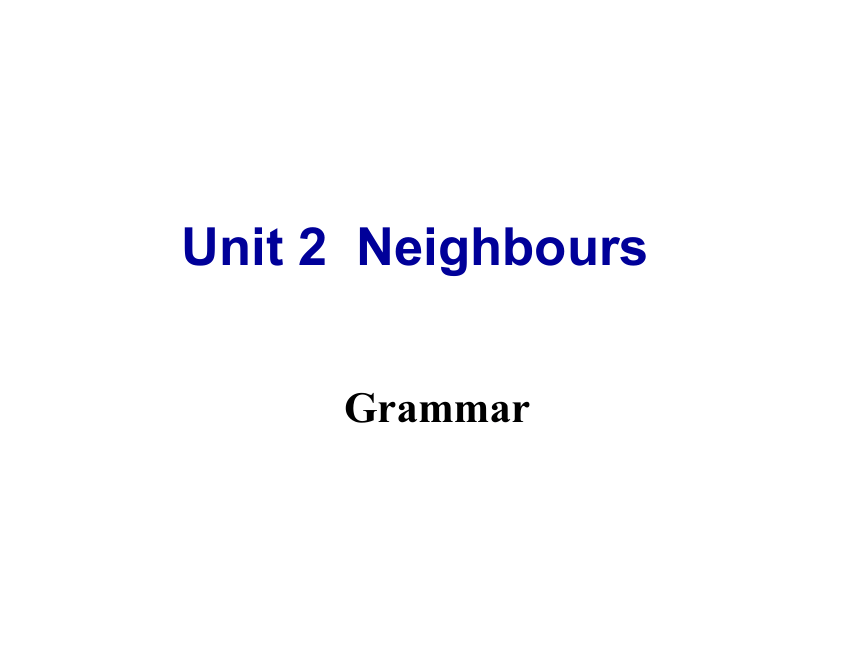 | |
| 格式 | zip | ||
| 文件大小 | 187.9KB | ||
| 资源类型 | 教案 | ||
| 版本资源 | 牛津译林版 | ||
| 科目 | 英语 | ||
| 更新时间 | 2016-03-15 08:46:32 | ||
图片预览

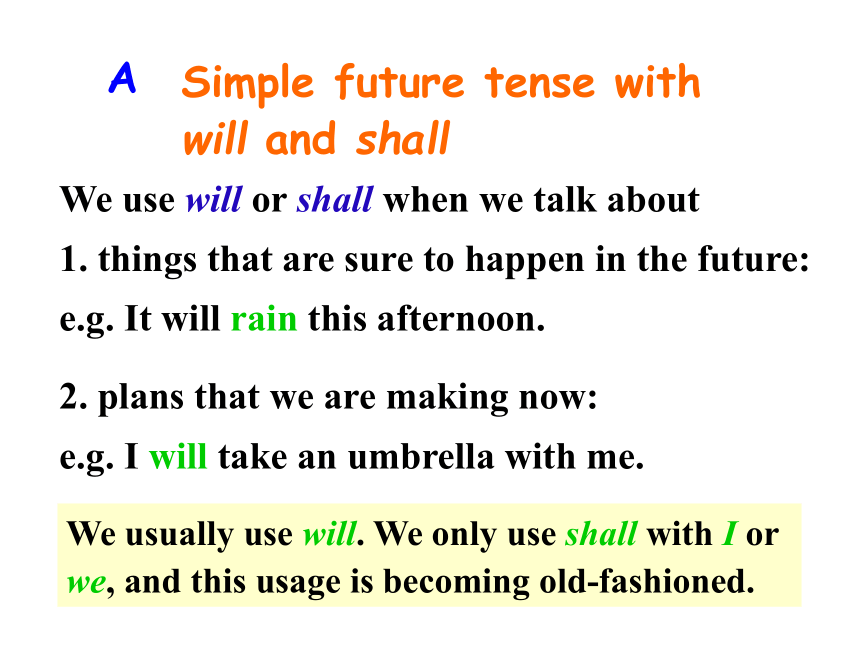
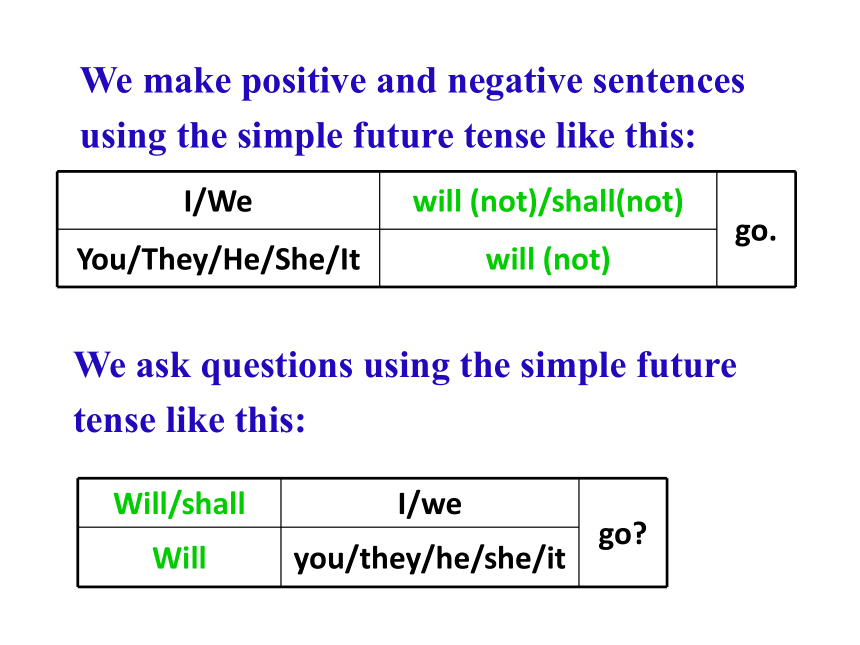
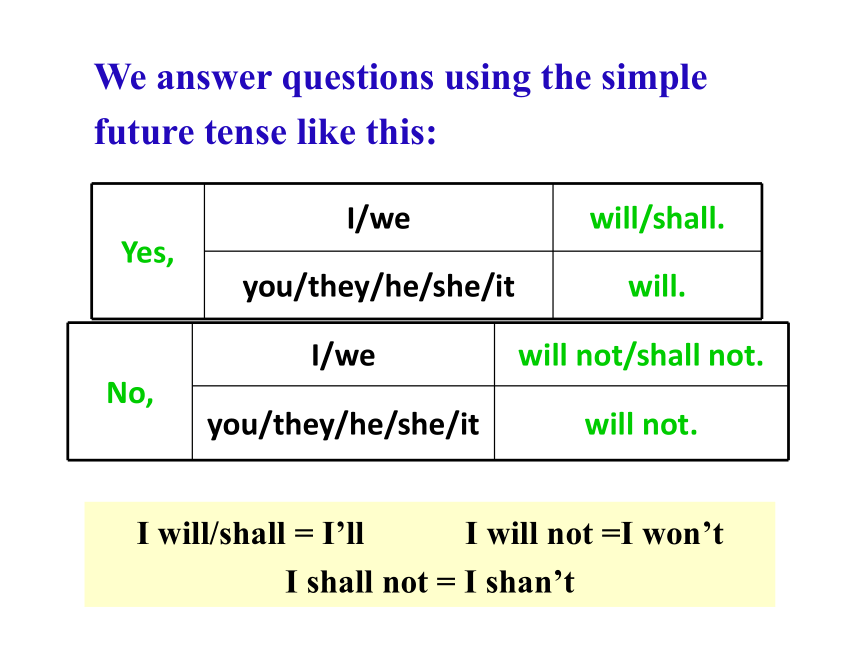

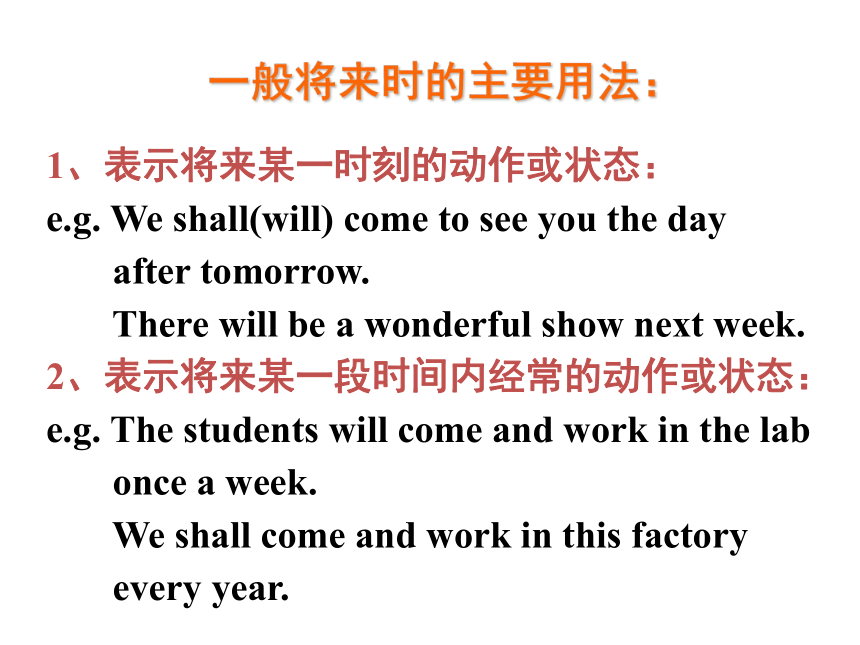
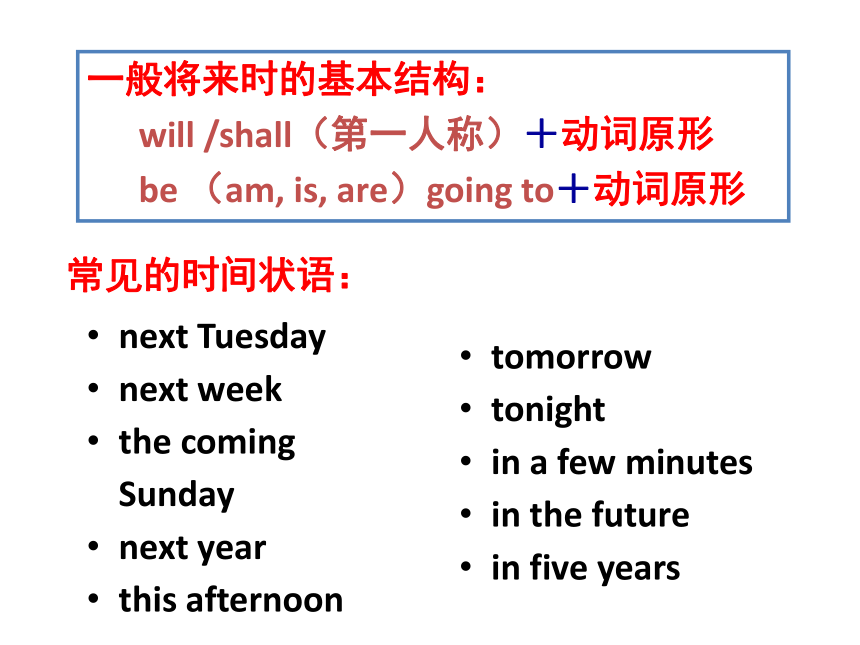

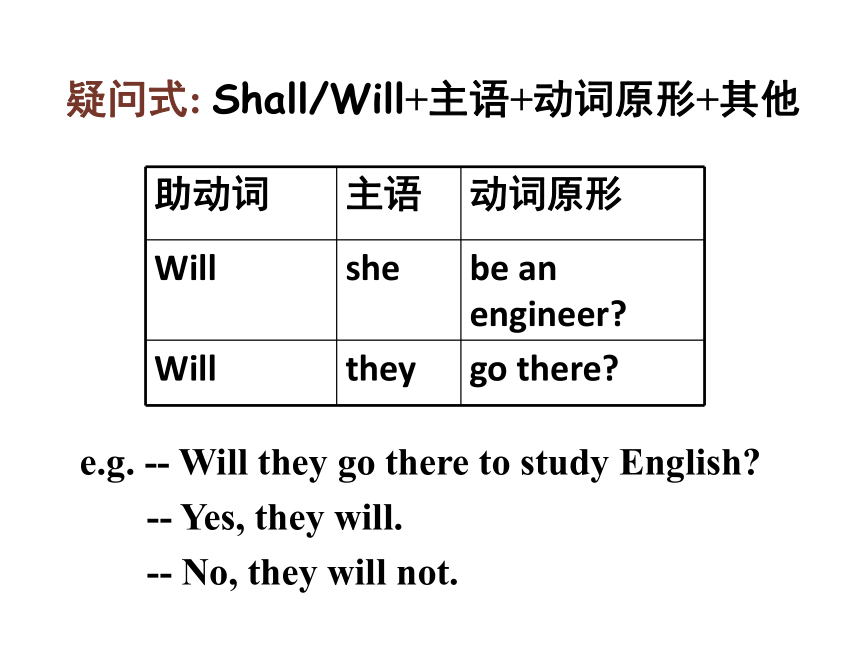
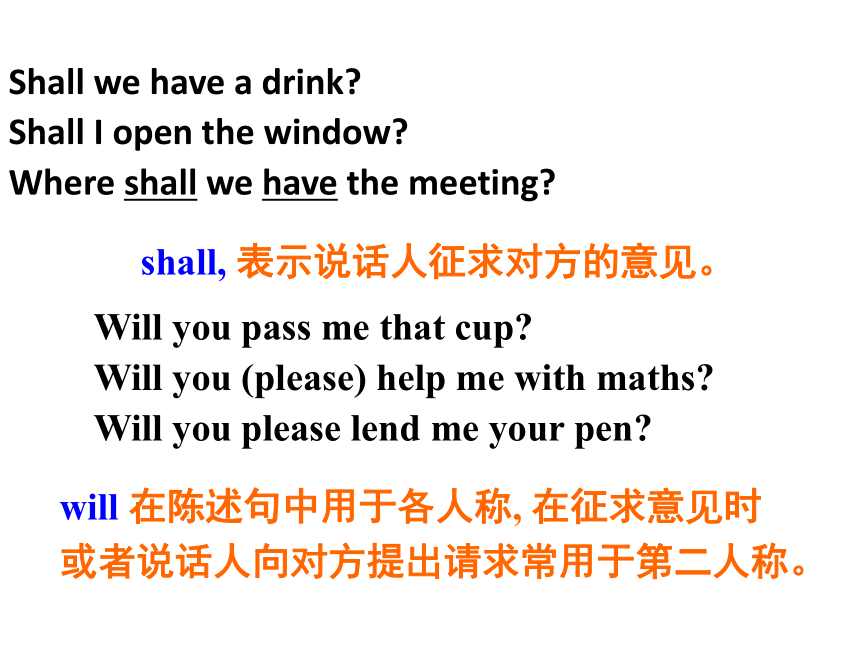


文档简介
课件37张PPT。Unit 2 Neighbours Grammar We use will or shall when we talk about
1. things that are sure to happen in the future:
e.g. It will rain this afternoon.
2. plans that we are making now:
e.g. I will take an umbrella with me.Simple future tense with will and shallAWe usually use will. We only use shall with I or
we, and this usage is becoming old-fashioned.We make positive and negative sentences
using the simple future tense like this:We ask questions using the simple future tense like this:We answer questions using the simple future tense like this:I will/shall = I’ll I will not =I won’t
I shall not = I shan’t一般将来时表示将来某一时刻的动作或
状态,或将来某一段时间内经常的动作
或状态。(Simple Future Tense )一般将来时一般将来时的主要用法:1、表示将来某一时刻的动作或状态:
e.g. We shall(will) come to see you the day
after tomorrow.
There will be a wonderful show next week.
2、表示将来某一段时间内经常的动作或状态:
e.g. The students will come and work in the lab
once a week.
We shall come and work in this factory
every year.一般将来时的基本结构:
will /shall(第一人称)+动词原形
be (am, is, are)going to+动词原形常见的时间状语:next Tuesday
next week
the coming Sunday
next year
this afternoontomorrow
tonight
in a few minutes
in the future
in five years一般将来时的构成: 一般将来时表示将来发生的动作或存在的状态, 助动词shall/will + 动词原形(当主语为第一人称时,一般用shall,shall用于第一人称,也可以被will 所代替。)肯定式: 主语+shall/will+动词原形+其他 否定式: 主语+shall/will+not+动词原形+其他
疑问式: Shall/Will+主语+动词原形+其他
简略回答: (肯) Yes, 主语 + shall/will
(否) No, 主语 + shall/will+not … 疑问式: Shall/Will+主语+动词原形+其他e.g. -- Will they go there to study English?
-- Yes, they will.
-- No, they will not.shall, 表示说话人征求对方的意见。Will you pass me that cup?
Will you (please) help me with maths?
Will you please lend me your pen? Shall we have a drink? Shall I open the window? Where shall we have the meeting? will 在陈述句中用于各人称, 在征求意见时或者说话人向对方提出请求常用于第二人称。特殊疑问句一般将来时的特殊疑问句是将疑问词放在句首,后接一般疑问句。(就主语提问时,以
疑问词 who 开头的疑问句除外。)e.g. -- Why will you be here on Sunday?
-- I’ll have a meeting on Sunday. 对特殊疑问句要进行具体回答。Mr. Lin: Hello, Simon. Do you need any help?
Simon: Yes, Mr. Lin. There’s something
wrong with my computer.Simon’s computer is broken. He is asking someone at the community centre for help. Complete their conversation with the simple future tense of the verbs in brackets.Asking for helpMr. Lin: OK. We <1> _________(ask) an
engineer to check it for you.
Simon: When <2> ____the engineer ____ (be)
free?
Mr. Lin: Well, we <3> ________ (call) him
first. <4> ______you ________(wait)
for us to call back?
Simon: All right. I <5> __________ (wait)
for your call. Thanks.
Mr. Lin: You’re welcome.will bewill callWill waitshall waitshall askWe use be going to when we talk about
1. something we decide to do:
e.g. I am going to visit our new neighbours.
She is going to watch the film next Friday.
2. things that will probably happen:
e.g. It is nine o’clock. We are going to be late.
It is so cloudy. I think it is going to rain.Simple future tense with be going toBWe ask and answer questions with be going to like this:When we use be going to without a time expression, we are talking about the near future.We often use some time expressions when we talk about the future.
this afternoon tonight tomorrow
the day after tomorrow this Sunday next Tuesday next weekare not = aren’t is not = isn’tTips肯定句?:
主语?+?be?(?am,?is,?are?)?+?going?to?+?动词原形?
e.g. I’m?going?to?go?there?next?month.?
下个月我将去那里。? ?? He?is?going?to?visit?his?grandparents?next?year.
明年他将要去看望他的爷爷奶奶。? ?? They?are?going?to?find?a?new?house?to?live?in.
他们将要找一所新房子住。? Be + going + to否定句?:
主语?+?be?(?am,?is,?are?)?+?not?+?going?
to?+?动词原形?
e.g. He?isn’t?going?to?see?the?movie.
? 他不会去看电影。? ?? You?aren’t?going?to?work?on?the?farm?this?
weekend.?
这个周末你们不去农场劳动。?
We?aren’t?going?to?have?a?meeting?this?
afternoon.?
今天下午我们不开会。? 疑问句:? ?
be?(?am,?is,?are?)?+ 主语 + going?to
+动词原形?
e.g. Are?you?going?to?have?a?party?tomorrow??
明天你们要举办聚会吗?? ????? Is?he?going?to?write?to?his?friends??
他要给他的朋友们写信吗?? ????? Are?they?going?to?buy?a?new?car??
他们要买一辆新车吗?? ?特殊疑问句:?
? 特殊疑问词?+?be?(?am,?is,?are?)?+?主语?
+?going?to?+?动词原形? e.g. What?are?you?going?to?have?tomorrow??
明天你们要吃什么?? ? What?are?you?going?to?do?tonight??I’m?
going?to watch?the?baseball?game.
今晚你打算做什么?我想要看棒球赛。 Simon is telling Amy about his plan for a day out with his uncle’s family. Help him use the correct forms of be going to to talk about his plan.Planning a day outSimon: Hi, Amy. My parents and I are
planning a day out with my uncle’s
family the day after tomorrow.
Amy: Great! What (1) ___ you__________(do)?
Simon: I (2) ______________(buy) some food,
and my cousin Annie (3)____________
(buy) some plates and forks.
Amy: What (4) ___ your parents___________
(do)?are going to doam going to buyis going to buyare going to doSimon: They (5) __________________(bring)
some water.
Amy: How about your uncle?
Simon: He (6) ________________(make) a fire.
Amy: And your aunt? What (7) ___ she
____________(do)?
Simon: She (8) ______________
(cook) some food. are going to bringis going to makeisgoing to dois going to cook两者有时可以通用, 但两者有时有区别: 只是单纯地预测未来的事, 此时可与will互换。 e.g. I think it is going to/will rain this evening. 我认为今晚要下雨。1.当表示主观方面“打算, 准备” 去做什么事
情的时候, 往往用be going to +动词原形, 而will 则多用来表示纯属客观的将来:一般将来时两种基本句式的区别:e.g. --- What are you going to do this evening?
--- I’m going to see a film.
--- 今天晚上你打算干嘛?
--- 我打算去看电影。
You will be forty years old next year.
明年你就40岁了。
Tomorrow will be Sunday again.
明天又是周天了。2. be going to+动词原形可表示事先计划的意
图, 而will 则表示说话人当时决定的意图。e.g. Don’t call a taxi. We’ll drive you home.
We’re going to drive you home after the
meeting.
I feel ill now, and I’ll go to see the doctor.
I’m going to see the doctor this evening.e.g. He is studying hard and is going to try for
the exams.?他正努力学习, 准备参加考试。
(不能用will替换)
—Can somebody help me?
—谁能帮我一下吗?
—I will.? —我来。
(不能用be going to替换)试比较“There be”句型的一般将来时
肯定句: There will be +名词+其他成份
[注意]:无论后面加单数名词或复数形式, be
都必须用原形。
e.g. There will be only one country.
否定句:在will后面加not.
e.g. There won’t be only one country.
一般疑问句:把will提到there之前。
e.g. Will there be only one country?
Yes, there will. / No, there won’t.注意:在口语中,所有人称都可以用will。表示即将要发生的动作。
e.g. Hurry up! We’re about to leave.
The football match is about to begin in
a few minutes.1. be about to 结构表示将来拓展2. 现在进行时表将来
??? 表示位置转移的动词常与现在进行时
和表示将来的时间状语连用,表示在最近
将要发生某事。这些事是事先安排好的。
e.g. The Browns are coming to dinner
tomorrow.
明天布朗夫妇要来吃晚饭。 3. 一般现在时表将来
??? 动词be; 表示位置转移的动词和表示“开始, 结束”的动词(如start, begin, open, finish, end, close等)与一般现在时和表示将来的时间状语连用, 表示时间表、节目单或日程表上所安排好的动作或事情将要发生, 日程不易改变, 口气肯定。
e.g. School finishes on January 18th.
学期一月十八日结束。1. I think every home will a car.
A. be B. have C. has D. there be
2. Will there be more trees? Yes, .
A. they will B. there will
C. there will be D. there have
3. Will there more cars in people’s
homes?
A. have B. has C. be D. /Exercises一、单选。二、汉译英。
1. 明天, 我们学校将有场足球赛, 我准备去看。
2. 我打算和李明一起复习功课.
3. 将来每个人都有一台计算机.Tomorrow, there will be a football match
in our school. I’m going to watch it.I’m going to revise lessons with Li Ming.Everyone will have a computer in the
future.4. 梅梅正在做饭。今天晚上她要把饭带到
晚会上去。
5. 我理想的学校将有宽大的教室和图书室。
6. 学生将在电脑上与老师对话。Meimei is cooking, she will take the food
to the party this evening.My dream school will have big classrooms
and libraries.Students will talk to their teachers on the
computers.7. 将来有学校吗?不, 没有。
8.我们将使用因特网在家里学习。Will there be schools in the future?
No, there won’t.We will use the Internet to study at home.1. I think there will be more pollution.
(改为否定句)
I ______ think there ______ be more pollution.
2. He will have a good time.
He _____ _____ a good time. (否定句)
_____ he _____ a good time? (一般疑问句)
3. Mary will get home at nine this evening.
(划线部分提问)
______ ______ Mary get home?don’t willwon’t haveWill haveWhen will三、按要求填空。Homework Practice what you have learnt in
the section Grammar.
1. things that are sure to happen in the future:
e.g. It will rain this afternoon.
2. plans that we are making now:
e.g. I will take an umbrella with me.Simple future tense with will and shallAWe usually use will. We only use shall with I or
we, and this usage is becoming old-fashioned.We make positive and negative sentences
using the simple future tense like this:We ask questions using the simple future tense like this:We answer questions using the simple future tense like this:I will/shall = I’ll I will not =I won’t
I shall not = I shan’t一般将来时表示将来某一时刻的动作或
状态,或将来某一段时间内经常的动作
或状态。(Simple Future Tense )一般将来时一般将来时的主要用法:1、表示将来某一时刻的动作或状态:
e.g. We shall(will) come to see you the day
after tomorrow.
There will be a wonderful show next week.
2、表示将来某一段时间内经常的动作或状态:
e.g. The students will come and work in the lab
once a week.
We shall come and work in this factory
every year.一般将来时的基本结构:
will /shall(第一人称)+动词原形
be (am, is, are)going to+动词原形常见的时间状语:next Tuesday
next week
the coming Sunday
next year
this afternoontomorrow
tonight
in a few minutes
in the future
in five years一般将来时的构成: 一般将来时表示将来发生的动作或存在的状态, 助动词shall/will + 动词原形(当主语为第一人称时,一般用shall,shall用于第一人称,也可以被will 所代替。)肯定式: 主语+shall/will+动词原形+其他 否定式: 主语+shall/will+not+动词原形+其他
疑问式: Shall/Will+主语+动词原形+其他
简略回答: (肯) Yes, 主语 + shall/will
(否) No, 主语 + shall/will+not … 疑问式: Shall/Will+主语+动词原形+其他e.g. -- Will they go there to study English?
-- Yes, they will.
-- No, they will not.shall, 表示说话人征求对方的意见。Will you pass me that cup?
Will you (please) help me with maths?
Will you please lend me your pen? Shall we have a drink? Shall I open the window? Where shall we have the meeting? will 在陈述句中用于各人称, 在征求意见时或者说话人向对方提出请求常用于第二人称。特殊疑问句一般将来时的特殊疑问句是将疑问词放在句首,后接一般疑问句。(就主语提问时,以
疑问词 who 开头的疑问句除外。)e.g. -- Why will you be here on Sunday?
-- I’ll have a meeting on Sunday. 对特殊疑问句要进行具体回答。Mr. Lin: Hello, Simon. Do you need any help?
Simon: Yes, Mr. Lin. There’s something
wrong with my computer.Simon’s computer is broken. He is asking someone at the community centre for help. Complete their conversation with the simple future tense of the verbs in brackets.Asking for helpMr. Lin: OK. We <1> _________(ask) an
engineer to check it for you.
Simon: When <2> ____the engineer ____ (be)
free?
Mr. Lin: Well, we <3> ________ (call) him
first. <4> ______you ________(wait)
for us to call back?
Simon: All right. I <5> __________ (wait)
for your call. Thanks.
Mr. Lin: You’re welcome.will bewill callWill waitshall waitshall askWe use be going to when we talk about
1. something we decide to do:
e.g. I am going to visit our new neighbours.
She is going to watch the film next Friday.
2. things that will probably happen:
e.g. It is nine o’clock. We are going to be late.
It is so cloudy. I think it is going to rain.Simple future tense with be going toBWe ask and answer questions with be going to like this:When we use be going to without a time expression, we are talking about the near future.We often use some time expressions when we talk about the future.
this afternoon tonight tomorrow
the day after tomorrow this Sunday next Tuesday next weekare not = aren’t is not = isn’tTips肯定句?:
主语?+?be?(?am,?is,?are?)?+?going?to?+?动词原形?
e.g. I’m?going?to?go?there?next?month.?
下个月我将去那里。? ?? He?is?going?to?visit?his?grandparents?next?year.
明年他将要去看望他的爷爷奶奶。? ?? They?are?going?to?find?a?new?house?to?live?in.
他们将要找一所新房子住。? Be + going + to否定句?:
主语?+?be?(?am,?is,?are?)?+?not?+?going?
to?+?动词原形?
e.g. He?isn’t?going?to?see?the?movie.
? 他不会去看电影。? ?? You?aren’t?going?to?work?on?the?farm?this?
weekend.?
这个周末你们不去农场劳动。?
We?aren’t?going?to?have?a?meeting?this?
afternoon.?
今天下午我们不开会。? 疑问句:? ?
be?(?am,?is,?are?)?+ 主语 + going?to
+动词原形?
e.g. Are?you?going?to?have?a?party?tomorrow??
明天你们要举办聚会吗?? ????? Is?he?going?to?write?to?his?friends??
他要给他的朋友们写信吗?? ????? Are?they?going?to?buy?a?new?car??
他们要买一辆新车吗?? ?特殊疑问句:?
? 特殊疑问词?+?be?(?am,?is,?are?)?+?主语?
+?going?to?+?动词原形? e.g. What?are?you?going?to?have?tomorrow??
明天你们要吃什么?? ? What?are?you?going?to?do?tonight??I’m?
going?to watch?the?baseball?game.
今晚你打算做什么?我想要看棒球赛。 Simon is telling Amy about his plan for a day out with his uncle’s family. Help him use the correct forms of be going to to talk about his plan.Planning a day outSimon: Hi, Amy. My parents and I are
planning a day out with my uncle’s
family the day after tomorrow.
Amy: Great! What (1) ___ you__________(do)?
Simon: I (2) ______________(buy) some food,
and my cousin Annie (3)____________
(buy) some plates and forks.
Amy: What (4) ___ your parents___________
(do)?are going to doam going to buyis going to buyare going to doSimon: They (5) __________________(bring)
some water.
Amy: How about your uncle?
Simon: He (6) ________________(make) a fire.
Amy: And your aunt? What (7) ___ she
____________(do)?
Simon: She (8) ______________
(cook) some food. are going to bringis going to makeisgoing to dois going to cook两者有时可以通用, 但两者有时有区别: 只是单纯地预测未来的事, 此时可与will互换。 e.g. I think it is going to/will rain this evening. 我认为今晚要下雨。1.当表示主观方面“打算, 准备” 去做什么事
情的时候, 往往用be going to +动词原形, 而will 则多用来表示纯属客观的将来:一般将来时两种基本句式的区别:e.g. --- What are you going to do this evening?
--- I’m going to see a film.
--- 今天晚上你打算干嘛?
--- 我打算去看电影。
You will be forty years old next year.
明年你就40岁了。
Tomorrow will be Sunday again.
明天又是周天了。2. be going to+动词原形可表示事先计划的意
图, 而will 则表示说话人当时决定的意图。e.g. Don’t call a taxi. We’ll drive you home.
We’re going to drive you home after the
meeting.
I feel ill now, and I’ll go to see the doctor.
I’m going to see the doctor this evening.e.g. He is studying hard and is going to try for
the exams.?他正努力学习, 准备参加考试。
(不能用will替换)
—Can somebody help me?
—谁能帮我一下吗?
—I will.? —我来。
(不能用be going to替换)试比较“There be”句型的一般将来时
肯定句: There will be +名词+其他成份
[注意]:无论后面加单数名词或复数形式, be
都必须用原形。
e.g. There will be only one country.
否定句:在will后面加not.
e.g. There won’t be only one country.
一般疑问句:把will提到there之前。
e.g. Will there be only one country?
Yes, there will. / No, there won’t.注意:在口语中,所有人称都可以用will。表示即将要发生的动作。
e.g. Hurry up! We’re about to leave.
The football match is about to begin in
a few minutes.1. be about to 结构表示将来拓展2. 现在进行时表将来
??? 表示位置转移的动词常与现在进行时
和表示将来的时间状语连用,表示在最近
将要发生某事。这些事是事先安排好的。
e.g. The Browns are coming to dinner
tomorrow.
明天布朗夫妇要来吃晚饭。 3. 一般现在时表将来
??? 动词be; 表示位置转移的动词和表示“开始, 结束”的动词(如start, begin, open, finish, end, close等)与一般现在时和表示将来的时间状语连用, 表示时间表、节目单或日程表上所安排好的动作或事情将要发生, 日程不易改变, 口气肯定。
e.g. School finishes on January 18th.
学期一月十八日结束。1. I think every home will a car.
A. be B. have C. has D. there be
2. Will there be more trees? Yes, .
A. they will B. there will
C. there will be D. there have
3. Will there more cars in people’s
homes?
A. have B. has C. be D. /Exercises一、单选。二、汉译英。
1. 明天, 我们学校将有场足球赛, 我准备去看。
2. 我打算和李明一起复习功课.
3. 将来每个人都有一台计算机.Tomorrow, there will be a football match
in our school. I’m going to watch it.I’m going to revise lessons with Li Ming.Everyone will have a computer in the
future.4. 梅梅正在做饭。今天晚上她要把饭带到
晚会上去。
5. 我理想的学校将有宽大的教室和图书室。
6. 学生将在电脑上与老师对话。Meimei is cooking, she will take the food
to the party this evening.My dream school will have big classrooms
and libraries.Students will talk to their teachers on the
computers.7. 将来有学校吗?不, 没有。
8.我们将使用因特网在家里学习。Will there be schools in the future?
No, there won’t.We will use the Internet to study at home.1. I think there will be more pollution.
(改为否定句)
I ______ think there ______ be more pollution.
2. He will have a good time.
He _____ _____ a good time. (否定句)
_____ he _____ a good time? (一般疑问句)
3. Mary will get home at nine this evening.
(划线部分提问)
______ ______ Mary get home?don’t willwon’t haveWill haveWhen will三、按要求填空。Homework Practice what you have learnt in
the section Grammar.
